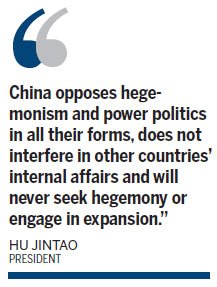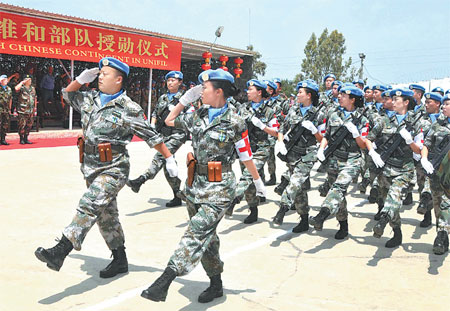China cements role as global mediator
Updated: 2012-12-28 07:28
By Cheng Guangjin (China Daily)
|
||||||||
|
China's peacekeeping medical team on parade at its base in southern Lebanon in May. Liu Shun / Xinhua |

Editor's note: The year 2012 saw China more actively involved in regional and international affairs, making a bigger contribution to sustainable development and to global peace and prosperity. Although certain challenges and difficulties will continue in 2013, China should take on more responsibilities in the area of global governance, analysts told China Daily.
In a strife-torn world burdened by a global economic downturn, China has become more deeply involved in the resolution of regional and international conflicts, indicating its emergence as a mediator.
Since the "Arab Spring", China has used its veto power several times in the United Nations Security Council and played a constructive role in the mediation of the ongoing crisis in Syria.
China is one of the six parties involved in the talks on the Iranian nuclear issue and has been a major contributor to the recovery from the global economic crisis.
The size of China's economy and its growing influence on the world stage have gradually molded the country into a mediator in regional and international issues, analysts said.
"As the largest developing economy, China should assume more responsibility in global governance," said Yu Keping, deputy director of the Central Compilation and Translation Bureau of the Communist Party of China Central Committee.
In recent years, the Chinese government and academics have paid increasing attention to how China should participate in the governance of international affairs, Yu said at a forum in Beijing recently.
More participation in such issues within its capability will also help China maintain a peaceful environment, which is necessary for its own development, many analysts said.
In the past year, China's mediation efforts paid off in working toward a resolution of the crisis in Syria, although some critics said China's mediation role runs counter to its non-interference principle.
The Chinese government sent Li Huaxin, its special envoy and former ambassador to Syria, to the area twice within a month, between February and March, this year to mediate among the countries and parties concerned as tension escalated.
In the visit to Syria from March 6 to 7, Li met both Syrian government officials and heads of opposition groups and urged the Syrian government and all parties concerned to immediately halt the violence.
Not long before the two-day visit, Li visited Egypt, Saudi Arabia and Qatar, where he exchanged views on the situation in Syria with leaders of these countries and the Arab League.
Also in March, Assistant Foreign Minister Zhang Ming visited Saudi Arabia, Egypt and France as the Chinese government's special envoy, in an effort to push for a just, peaceful and appropriate settlement of the Syrian issue.
This is a big change in China's foreign policy practice, said Hong Kong-based commentator Liu Heping in an interview with Shenzhen TV.
According to Liu, in past decades, when a crisis happened in another country, China's usual practice was to call for restraint from the parties involved and to form a peaceful resolution through dialogue, but not to take concrete action.
However, in the Syria crisis, China has sent special envoys to mediate. Liu especially pointed out the word "urge" used by the envoy, which indicated a change in China's diplomatic style of absolute non-interference.
China has initiated and been adhering to the "five principles of peaceful coexistence" for the last 60 years. "Mutual non-interference in each other's internal affairs" is one of the principles.
Liu noted that the nature of China's active participation in trying to resolve the Syria crisis is different from the intervention of some Western countries, as China respects Syria's sovereignty.
"The mediation is also based on China's role as a permanent member of the UN Security Council and responds to the calls for it to become a responsible big power," Liu said.
"Non-interference in each other's internal affairs does not mean doing nothing," said Wu Sike, China's special envoy to the Middle East.
China has forged an image of a trustworthy and responsible country by adhering to its principles and showing flexibility when dealing with various problems according to the actual situations in international forums such as the UN, Wu wrote in an article published in People's Daily.
In the past decade, China has been stepping up efforts to help resolve regional and international issues with the appointments of special envoys and representatives to several areas, including the Middle East, the Korean Peninsula and Africa.
Wang Shijie, China's first special envoy to the Middle East, was appointed in 2002.
Wang said the appointment was in accordance with China's increasing power and growing influence in world affairs.
"Some Middle East countries have asked for China to play a bigger role in the region and urged the Chinese government to send a special envoy," Wang told Wenhui Daily in Shanghai.
"The fact that the Chinese government decided to appoint me as the special envoy to the Middle East shows China's concerns about the Middle East issue and its support for a Middle East peace process."
Whether China's mediating efforts contradict its principle of "non-interference in internal affairs" has been questioned not only in the Middle East but also in Africa.
Liu Guijin served as the first special envoy of the Chinese government on African affairs from 2007 to 2012 and witnessed the independence of South Sudan in 2011.
Liu responded to such a question during an online interview with Xinhua News Agency, saying there is no contradiction between China's mediation efforts and its non-interference policy in the process of the independence of South Sudan.
"Adhering to the non-interference principle doesn't mean that we cannot give suggestions to Sudan and analyze the situation with relevant parties," Liu said.
"What's more important is that we are not doing this with big sticks. We didn't threaten them with stopping trade or not doing business with them if they didn't do what we said. We never do that," Liu said.
China's relative absence from contemporary international mediation initiatives since its founding in 1949 is "likely a consequence of the non-interference principle", said Wu Xiaohui, former associate of the international security program at Belfer Center for Science and International Affairs at Harvard University.
However, driven by its "increasing international status, coupled with the intensification of unresolved and newly emerging conflicts that are threatening its own as well as world security", gradual changes have taken place in its growing mediation efforts, Wu wrote in an article published in the Conflict Resolution Quarterly.
A Confucianism and Taoism-based value system, to which the concepts of relationship and "harmony and cooperation" are fundamental, are the wellsprings of China's mediation culture, she said.
"China opposes hegemonism and power politics in all their forms, does not interfere in other countries' internal affairs and will never seek hegemony or engage in expansion," said President Hu Jintao in the report at the 18th National Congress of the Communist Party of China in November.
"China will continue to keep in mind both the interests of the Chinese people and the common interests of the people of all countries, get more actively involved in international affairs, play its role of a major responsible country and work jointly with other countries to meet global challenges," Hu said, setting out a vision for future leaders of China.
chengguangjin@chinadaily.com.cn
(China Daily 12/28/2012 page10)

 Relief reaches isolated village
Relief reaches isolated village
 Rainfall poses new threats to quake-hit region
Rainfall poses new threats to quake-hit region
 Funerals begin for Boston bombing victims
Funerals begin for Boston bombing victims
 Quake takeaway from China's Air Force
Quake takeaway from China's Air Force
 Obama celebrates young inventors at science fair
Obama celebrates young inventors at science fair
 Earth Day marked around the world
Earth Day marked around the world
 Volunteer team helping students find sense of normalcy
Volunteer team helping students find sense of normalcy
 Ethnic groups quick to join rescue efforts
Ethnic groups quick to join rescue efforts
Most Viewed
Editor's Picks

|

|

|

|

|

|
Today's Top News
Health new priority for quake zone
Xi meets US top military officer
Japan's boats driven out of Diaoyu
China mulls online shopping legislation
Bird flu death toll rises to 22
Putin appoints new ambassador to China
Japanese ships blocked from Diaoyu Islands
Inspired by Guan, more Chinese pick up golf
US Weekly

|

|







